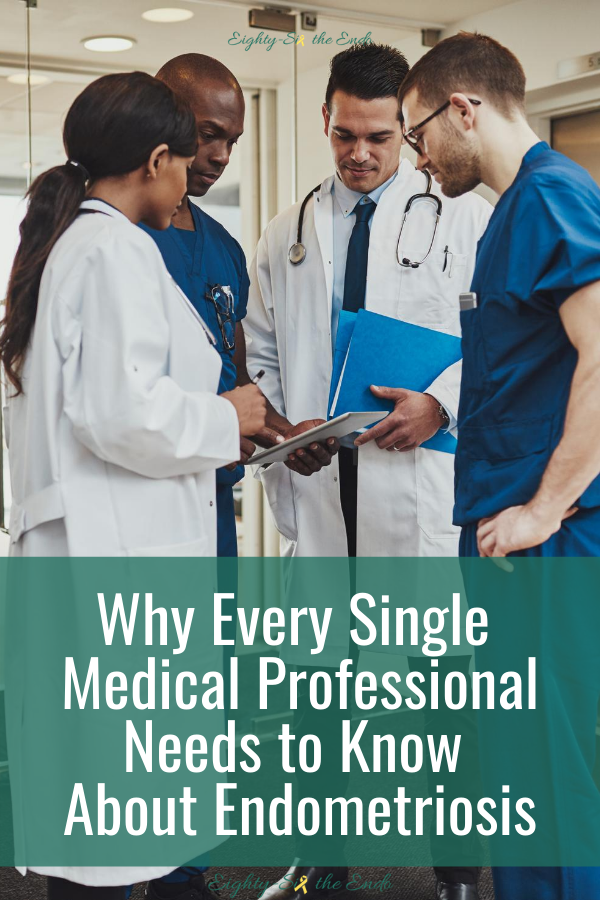It baffles me just how unaware most medical professionals are when it comes to endometriosis. Not only are they vastly miseducated with century old information, but I can guarantee that many healthcare professionals don’t think that they need to know about endometriosis. The truth is every single medical professional needs to know about endometriosis.
It does not matter if they work primarily in women’s health or not. Because, although they may believe it to be a women’s health issue, endometriosis is not a reproductive disease. Although it may affect the reproductive system, it is actually a chronic, systemic, and inflammatory disease that is characterized by endometrial-like tissue being found outside of the uterus.
In fact, there is a lot of evidence proving that it doesn’t even originate from the female reproductive tract to begin with; yet this is a common misconception amongst medical professionals.
Endometriosis has been found in cis-men and the LGBTQ community, yet many providers don’t even consider endometriosis to be a differential diagnosis when their patients present with symptoms of endometriosis. Most still believe that extrapelvic symptoms have nothing to do with endometriosis.
Phrases like, “Oh, that’s really rare” and “those symptoms can’t be related to endometriosis” are often told to patients who have done their research and are convinced their symptoms are caused by extrapelvic endometriosis.

Gaslighting of Endometriosis Patients
Yet, somehow, patients continue to be gaslit by countless providers, only to eventually be proven right when they finally make it to an endometriosis expert – when the symptoms have become so severe and the endometriosis has invaded vital organs.
It has to stop! Healthcare providers need to open their eyes and realize that their professional education on endometriosis was based off debunked theories driven by big pharma. Even more so, professional organizations, like the American College of Obstetrics and Gynecology (ACOG), need to listen to the countless experts who have been speaking up for the struggling endometriosis patient population.
Healthcare providers need to realize that it is not the sole responsibility of an Ob-Gyn to recognize endometriosis – a disease that affects all major sub-specialties. Each provider needs to remember that they have a duty to protect their patients from losing vital organs. . . not just reproductive ones. Because far too many people with endometriosis are ending up with damaged organs from delays in diagnosis that can be traced back to multiple providers not believing them or not understanding the severity and prevalence of endometriosis.
And so, I want to address the many specialties that need to know about endometriosis, even if they don’t believe so. I want to provide them the information they need to understand why every single medical professional needs to know about endo.
And I want to give you, the endo warrior, the peer-reviewed journaled articles that you can share with the many specialists you have been referred to or may be referred to, so that you can respectfully enlighten them and educate them.
Note: See this link for a list of some of the most highly regarded surgeons in multidisciplinary endometriosis excision surgery: https://centerforendo.com/collaboratives. They can be excellent resources to physicians who want to learn more and refer out to endometriosis specialists.
Video credit: Retrieved on 8/12/2020 from https://www.endowhat.org/healthcare-providers
Gastroenterology
GI symptoms, specifically bowel symptoms, are so common in endometriosis that it is often misdiagnosed as IBS, IBD, Crohn’s and Ulcerative Colitis. This is a large reason why endometriosis has such a huge delay in diagnosis, averaging 8-10 years.
GI symptoms related to endo can include bloating, intestinal cramping, abdominal pain, constipation, diarrhea, rectal bleeding, painful bowel movements, nausea, and vomiting. Patients can have all of these symptoms or just one.
Countless GI panels, colonoscopies, and imaging studies can yield negative results, which leave patients and providers lost and frustrated. However, there are times when a colonoscopy does lead to an endometriosis diagnosis. This will then require surgical treatment from an expert Endo Excision Specialist who works closely with a General Surgeon experienced in resecting endometriosis. But even when endometriosis is not found to invade the colon or intestines, these symptoms can still be caused by superficial disease and adhesions.
If you are a patient and you believe you might have Endometriosis invading your bowel, your first step is to find an excision specialist. But if you happen to be an established patient with a gastroenterologist, respectfully provide them with the following studies and link, and ask for a referral to an endometriosis excision specialist.
- Ferrero, S., Camerini, G., Maggiore, U. L. R., Venturini, P. L., Biscaldi, E., & Remorgida, V. (2011). Bowel endometriosis: Recent insights and unsolved problems. World journal of gastrointestinal surgery, 3(3), 31. Retrieved from https://www.ncbi.nlm.nih.gov/pmc/articles/PMC3069336/
- Habib, N., Centini, G., Lazzeri, L., Amoruso, N., El Khoury, L., Zupi, E., & Afors, K. (2020). Bowel Endometriosis: Current Perspectives on Diagnosis and Treatment. International Journal of Women’s Health, 12, 35. Retrieved from https://www.ncbi.nlm.nih.gov/pmc/articles/PMC6996110/
- http://endopaedia.info/subtype18.html

Urology
Urinary tract endometriosis is second in line when looking at common sites of extrapelvic endometriosis, yet it’s often missed as a possibility. In fact, many people who have endometriosis affecting the urinary tract have no symptoms at all. But of those that do present with symptoms, they include frequent UTI symptoms with negative urinalysis, incontinence, retention, and in some cases, irreversible kidney damage.
Common sites of urinary tract endometriosis are, from highest to least prevalent, the bladder, ureter, Kidney, and urethra. And just like GI endometriosis, urinary tract endometriosis symptoms can be present with superficial disease, adhesions, or scar tissue forming around the ureters and urethra. It also requires very specialized surgical care from a multidisciplinary team led by an endometriosis excision expert.
Of course, ruling out other diseases like pelvic inflammatory disease (PID) are a must; while still remembering that endometriosis and PID can and often coexist.
If you are a patient and you believe you might have Endometriosis invading your urinary tract, your first step is to find an excision specialist. But if you happen to be an established patient with a urologist, respectfully provide them with the following studies and link, and ask for a referral to an endometriosis excision specialist.
- Maccagnano C, et al (2012). Diagnosis and Treatment of Bladder Endometriosis: State of the Art. Urologia Internationalis, 89(3), 249-258. doi: 10.1159/000339519
- Ponticelli C, Graziani G, Montanari E (2010). Ureteral Endometriosis: A Rare and Underdiagnosed Cause of Kidney Dysfunction. Nephron Clinical Practice, 114(2), c89-c94. doi: 10.1159/000254380
- http://endopaedia.info/subtype10.html

Pulmonology
Reoccurring cyclical chest pain is always a reason to suspect Thoracic Endometriosis, often called Thoracic Endometriosis Syndrome (TES). When found, it is often found on the diaphragm, pleura, and parenchyma. Many clinicians think this to be very rare, but the endometriosis community is finding that this is not as rare as we are made to believe.
Of course, when comparing it to the prevalence of other extrapelvic sites, it is not as common. But it should not be dismissed as a possibility, especially when patients present with catamenial pneumothorax, catamenial hemothorax, catamenial hemoptysis, cyclical chest pain and cyclical dyspnea. Other symptoms also include non-cyclical sensations of burning, tightness around the ribs, and difficulty breathing.
Common misdiagnoses often associated with TES are asthma, bronchitis, Pulmonary embolism, GERD, heartburn, and primary spontaneous pneumothorax.
Treatment of TES is obviously complicated and requires that an endometriosis excision expert has a cardiothoracic surgeon on board the case. Yet there are very few cardiothoracic surgeons who have experience in resecting endometriosis or have ever heard of it to begin with. Which is why it will always be best to refer suspected cases to a center specializing in endometriosis care. These centers see high volumes of complex cases and have Cardiothoracic surgeons who work with them frequently. A top center for TES is the Center for Endometriosis Care in Atlanta, GA.
If you are a patient and you believe you might have thoracic endometriosis, your first step is to find an excision specialist. But if you happen to be an established patient with a pulmonologist, respectfully provide them with the following studies and link, and ask for a referral to a center specializing in endometriosis care.
- Hwang, S. M., Lee, C. W., Lee, B. S., & Park, J. H. (2015). Clinical features of thoracic endometriosis: A single center analysis. Obstetrics & gynecology science, 58(3), 223–231. https://doi.org/10.5468/ogs.2015.58.3.223
- Visouli, A. N., Zarogoulidis, K., Kougioumtzi, I., Huang, H., Li, Q., Dryllis, G., Kioumis, I., Pitsiou, G., Machairiotis, N., Katsikogiannis, N., Papaiwannou, A., Lampaki, S., Zaric, B., Branislav, P., Porpodis, K., & Zarogoulidis, P. (2014). Catamenial pneumothorax. Journal of thoracic disease, 6(Suppl 4), S448–S460. https://doi.org/10.3978/j.issn.2072-1439.2014.08.49
- https://static1.squarespace.com/static/55d2150ee4b0d60073fd414e/t/5ea4873af222897b8d642ccb/1587840826680/Thoracic+Endometriosis+Syndrome_is+it+as+rare+as+once+believed.pdf
- http://endopaedia.info/subtype1.html

Cardiology
For obvious reasons, matters of the heart are very serious and frequent chest pains will always require a full cardiac work-up. But I implore Cardiologists and other healthcare providers specializing in cardiology to always consider Endometriosis, especially when all diagnostic tests come up negative or inconclusive.
For patients who have been found to have endometriosis on or around the pericardium, their symptoms are similar to the TES symptoms noted above. This, in large part, is due to diaphragmatic endometriosis often infiltrating into the pericardium. Therefore, it should be surgically treated using the same method with a multidisciplinary team.
If you are a patient and you believe you might have endometriosis invading areas around the heart and lungs, your first step is to find an excision specialist. But if you happen to be an established patient with a cardiologist, respectfully provide them with the following studies and link, and ask for a referral to a center specializing in endometriosis care.
Also, please note that the following published articles have incorrect definitions of endometriosis, so it would be largely beneficial to provide them with a printed copy of the link below by The Center for Endometriosis Care. Likewise, you can always refer them to the contact information of Dr. John W. Gouldman, MD, who works closely with the CEC for cardiothoracic cases.
- Ceccaroni, M., Roviglione, G., Rosenberg, P., Pesci, A., Clarizia, R., Bruni, F., Zardini, C., Ruffo, G., Placci, A., Crippa, S., & Minelli, L. (2012). Pericardial, pleural and diaphragmatic endometriosis in association with pelvic peritoneal and bowel endometriosis: a case report and review of the literature. Wideochirurgia Inne Techniki Maloinwazyjne, 7(2), 122–131. https://doi.org/10.5114/wiitm.2011.26758
- Ceccaroni, M., Clarizia, R., & Placci, A. (2010). Pericardial, pleural, and diaphragmatic endometriosis. The Journal of Thoracic and Cardiovascular Surgery, 140(5), 1189- 1190. https://doi.org/10.1016/j.jtcvs.2010.07.064
- https://centerforendo.com/endometriosis-understanding-a-complex-disease

Dermatology
Cutaneous Endometriosis is rare, but still possible. Cutaneous lesions should be taken seriously, as it is a risk factor for developing cutaneous melanoma. It has been found to be develop spontaneously, as well as associated with surgical scars. Regardless of how it develops, surgical wide excision of the lesion is the best treatment option.
Cutaneous lesions are often accompanied by cyclical pain and swelling at the lesion site. On some occasions it can be accompanied by cyclical bleeding of the lesion.
If you are a patient and you believe you might have cutaneous endo, your first step, again, is to find an excision specialist. But if you happen to be an established patient with a dermatologist, respectfully provide them with the following study and link, and ask for a referral to an endometriosis excision specialist.
- Kvaskoff, M., Mesrine, S., Fournier, A., Boutron-Ruault, M. C., & Clavel-Chapelon, F. (2007). Personal history of endometriosis and risk of cutaneous melanoma in a large prospective cohort of French women. Archives of Internal Medicine, 167(19), 2061–2065. https://doi.org/10.1001/archinte.167.19.2061
- http://endopaedia.info/subtype13.html
Oncology
In addition to the above-mentioned risk of melanoma, there have been multiple studies that have noted an increased risk of developing ovarian cancer, despite the benign nature of endometriosis. Of course, more studies are always needed, but it is essential that oncologists understand the symptomatic presentation of endometriosis – beyond pelvic pain, heavy periods, and infertility.
Some patients are referred to oncologists due to concerning imaging studies, which eventually is identified as deep-infiltrating endometriosis (DIE). In cases where biopsies and testing result in negative or benign results, the oncologist is then able to help patients decrease their time to diagnosis. The average 8-10 year delay can be shortened if the oncologist knows to refer a patient to an excision specialist based on their complex and cyclical symptom presentation.
Additionally, surgical oncologists are in a unique position to help identify endometriosis during surgery, which would then prompt them to refer to an endometriosis excision expert. Basically, oncologists can play an important role in helping patients obtain the gold standard in endometriosis care.
- Melin, A., Sparén, P., Persson, I., Bergqvist, A. (2006). Endometriosis and the risk of cancer with special emphasis on ovarian cancer. Human Reproduction, 21(5), 1237- 1242. https://doi.org/10.1093/humrep/dei462
- Wilbur, M., Shih, I., Segars, J., Fader, A. (2017). Cancer Implications for Patients with Endometriosis. Seminars in Reproductive Medicine, 35(01), 110-116. DOI: 10.1055/s-0036-1597120

Orthopedics and Rheumatology
Endometriosis is a systemic and inflammatory disease. It is very common for patients to be sent from specialist to specialist in a search for answers to their join pain, joint swelling, and weakness. Many healthcare providers would not relate these symptoms to endometriosis at all. And although they are not directly caused by endometriosis, they often co-exist with endometriosis symptoms — making orthopedists and rheumatologists key members in decreasing delays to diagnosis.
Likewise, many studies have found an association between autoimmune diseases and endometriosis. This information is key to helping patients identify other pain generators and causes, which can be treated – leading to an improved quality of life.
- Greenbaum, H., Weil, C., Chodick, G., Shalev, V., Eisenberg, V. H. (2019). Evidence for an association between endometriosis, fibromyalgia, and autoimmune diseases. American Journal of Reproductive Immunology, 81(4). https://doi.org/10.1111/aji.13095
- Shigesi, N., Kvaskoff, M., Kirtley, S., Feng, Q., Fang, H., Knight, J. C., Missmer, S. A., Rahmioglu, N., Zondervan, K. T., & Becker, C. M. (2019). The association between endometriosis and autoimmune diseases: a systematic review and meta-analysis. Human reproduction update, 25(4), 486–503. https://doi.org/10.1093/humupd/dmz014
Video credit: Retrieved on 8/12/2020 from https://www.endowhat.org/healthcare-providers
Obstetrics and Gynecology
Although most other specialties would refer to OB-Gyn’s as the experts in endometriosis, endometriosis patients know better. And although I respect many well-meaning Ob-Gyn’s, the fact remains that only about 100 of them in the US are actually endometriosis experts.
Of these experts, many have admitted to having to unlearn the misinformation that was taught to them in medical school and residency programs. They admit that they learned more in their first week of MIGS fellowships when compared to their years in residency. Or they admit to treating patient using ACOG guidelines, only to find that their patients continued to suffer, which led them to seek better options for their patients.
So, although I respect well-meaning Ob-Gyn’s who treat patients based on what they have been taught, there must be a point when they begin to recognize that recommending medical management to diagnose and “cure” endometriosis is simply not working. Likewise, recommending that patients “just get pregnant” or have a hysterectomy to “cure” endo is unethical and does nothing to help treat the disease.
Therefore, I have so much more respect for those Ob-Gyn’s who refer patients to a true expert in endometriosis care – an expert in laparoscopic excision. Because at the end of the day, this will decrease delays in care, possible organ damage, and the unnecessary gaslighting that happens every day to this patient population.
If you are a patient and you believe you might have endometriosis and an Ob-Gyn has left you feeling lost, hopeless, or gaslit, you always have a right to seek a second, third, or fourth opinion. One step that may be easier than confronting your Ob-Gyn is to ask your General Practitioner or Primary Care Physician for a referral to an expert in laparoscopic excision. Having a physician in mind can be very helpful, as they may not know of one themselves. But if you feel comfortable speaking with your established Ob-Gyn, respectfully provide them with the following studies and link, and ask for a referral to a specialist in endometriosis excision.
- Byrne, D., Curnow, T., Smith, P., Cutner, A., Saridogan, E., Clark, T. J., & BSGE Endometriosis Centres (2018). Laparoscopic excision of deep rectovaginal endometriosis in BSGE endometriosis centres: a multicentre prospective cohort study. BMJ open, 8(4), e018924. https://doi.org/10.1136/bmjopen-2017-018924
- Pundir, J., Omanwa, K., Kovoor, E., Pundir, V., Lancaster, G., & Barton-Smith, P. (2017). Laparoscopic Excision Versus Ablation for Endometriosis-associated Pain: An Updated Systematic Review and Meta-analysis. Journal of minimally invasive gynecology, 24(5), 747–756. https://doi.org/10.1016/j.jmig.2017.04.008
- https://centerforendo.com/lapex-laparoscopic-excision-of-endometriosis

Reproductive Endocrinology
Infertility is a common battle for patients with endometriosis. In fact, about 50% of infertility cases are caused by endometriosis. This leads many patients to seek help from a Reproductive Endocrinologist to conceive.
However, many RE’s do not recognize that patients with endometriosis (or suspected endo) have improved fertility rates after expert excision of endometriosis. And although it is possible to conceive with endometriosis, there are so many disadvantages to not addressing endometriosis first – financial, emotional, and physical disadvantages.
It seems unethical to send patients through several rounds of failed invasive procedures when there are known benefits to having expert laparoscopic excision before trying things like IUI or IVF.
If you are a patient and you believe you are struggling with infertility secondary to endometriosis, your first step is to find an excision specialist. But if you happen to be an established patient with a reproductive endocrinologist, respectfully provide them with the following study and link, and ask for a referral to an expert in laparoscopic excision.
- Carneiro, M. M., Costa, L., & Ávila, I. (2017). To operate or not to operate on women with deep infiltrating endometriosis (DIE) before in vitro fertilization (IVF). JBRA assisted reproduction, 21(2), 120–125. https://doi.org/10.5935/1518-0557.20170027
- https://centerforendo.com/infertility-1#infertility

Psychology/Psychiatry
The mental toll it takes to be a patient navigating a medical system that fails them continuously has led many endo patients to depression, anxiety, and PTSD. Add the gaslighting that occurs from their physicians, nurses, family members and friends, and it is no wonder so many patients develop poor mental health and coping mechanisms.
Unfortunately, even licensed therapists, psychiatrists, and other mental health professionals are gaslighting this community. This all stems from the miseducation they receive on endometriosis. Therefore, it is vital that mental health professionals educate themselves on the symptom presentation of endometriosis, as well as the barriers that patients often face. A great place to start is by listening and believing your patients. But for expert opinion and advice on the disease, these sites can be very valuable to your understanding:

Neurology
Many endometriosis patients experience sciatic nerve pain, pain that radiates down the legs, and lumbar pain. This can be cyclical or at any point during the menstrual cycle. For many, this nerve related pain is due to pelvic floor dysfunction and pelvic adhesions that pull and constrict the nerves. These symptoms often subside after expert excision surgery and pelvic floor physical therapy.
However, in some cases, patients are found to have deep infiltrating endometriosis of the sciatic nerve. This requires surgical removal before irreversible nerve damage occurs. In such cases, a well-known expert in neuropelveology is Dr. Marc Possover.
If you are a patient and you believe you might have Deep infiltrating endometriosis of the sciatic nerve, your first step is to find an excision specialist. But if you happen to be an established patient with a neurologist, respectfully provide them with the following study and link, and ask for a referral to an expert in laparoscopic excision.
- Possover, M., Andersson, K. E., & Forman, A. (2017). Neuropelveology: An Emerging Discipline for the Management of Chronic Pelvic Pain. International Neurourology Journal, 21(4), 243–246. https://doi.org/10.5213/inj.1735036.518
- Possover M. (2017). Five-Year Follow-Up After Laparoscopic Large Nerve Resection for Deep Infiltrating Sciatic Nerve Endometriosis. Journal of Minimally Invasive Gynecology, 24(5), 822–826. https://doi.org/10.1016/j.jmig.2017.02.027

Emergency/Trauma
The final specialty I would like to address is that of Trauma and Emergency. As many ER physicians and nurses might know, endometriosis patients are often forced to go to the ER in desperation for relief from intractable pain. However, they are often discharged with no help, no pain relief, and recommendations to follow-up with their Ob-Gyn.
Not only is it severely uncompassionate to quickly discharge endometriosis patients, but it adds to the poor mental health that they already experience. And although I know ER services are just that – an emergency – you are doing a disservice to the endo population when you do not consider the pain to be emergent. The pain management of endometriosis patients should be taken just as seriously as intractable cancer pain – something that often leads to admission for pain management.
Although endometriosis is a benign disease, it has many parallels to cancer symptoms and barriers. And yet endo patients are discharged with no pain control, no resources, and inaccurate education. Likewise, there could be much less ER visits from endometriosis patients if they are provided with accurate education, resources, and referrals to the proper specialists at discharge.
Final Notes
Ultimately, the healthcare system and medical professionals need to do better. Shifting your mindset and re-educating yourself with accurate and up-to-date resources is key. Our patients deserve better from us and the healthcare system. They deserve to be heard and believed. They deserve compassion and understanding. And this is why every single medical professional needs to know about endometriosis.


